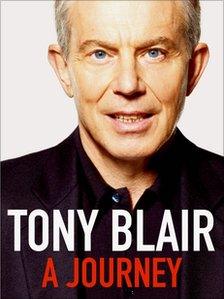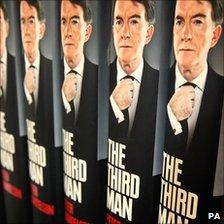How do you sum up a life story in two words?
- Published
Ex-Prime Minister Tony Blair is preparing to launch his memoirs on Wednesday, the title having been changed from The Journey to A Journey. But how much do the names of political autobiographies matter?

No longer the only journey, but one of many...
Hear the titles The Path to Power, or The Downing Street Years, for the first time and you would probably guess they were the memoirs of a former prime minister.
However, only the portraits on the cover would tell you they were those of Margaret Thatcher.
Similarly, a wander through the autobiography section of any bookshop will reveal dozens of books entitled My Story, or simply suffixed The Autobiography.
So Mr Blair is in good company by choosing a title which gives very little away about the book's contents.
Some commentators have suggested the tweak to A Journey was aimed at making it sound less pompous or even messianic, although publisher Random House has described it as a "minor editorial decision".
Former Labour minister Chris Mullin, whose irreverent and revealing diaries of his time on the backbenches won him widespread acclaim, says the title of his former boss's book "sounds a bit corny".
But, he adds, reading too much into it misses the point, because rarely is a book written by a major figure actually judged by its cover.
"It's the fact that it's Tony Blair. It's the name of the author selling it, not the title," says the former Sunderland South MP.
"If you're someone that not many people have heard of, you have to work a bit harder on a snappier title."
Mr Mullin's first set of diaries A View from the Foothills, was an account of life as a junior minister and backbencher between 1999 and 2005 - never quite at the summit of government.
The title of the second, Decline and Fall - released on Monday - echoes Evelyn Waugh's satire on 1920s society and "speaks for itself" about Labour's last four years in power, he says.
"You have to have an arresting title in some way related to the contents and not too heavy. You take a lot of time mulling over things and if you're lucky a good title comes to you."
James Stephens, sales and marketing director for political publisher Biteback, says A View from the Foothills is a "terrific" title - "very much him and what the book is about".
But in reality, he adds, it is rare for the politician to have much of a say.
"It's usually down to the marketing department and the name is often forced upon the author a little bit," says Mr Stephens.
"At a large publisher, there could be 20 or 30 people and between them they work out what will sell, perhaps coming up with something pithy or witty. They will go for whatever shifts books."
He says the tweak to A Journey's title probably came after one such meeting, with someone arguing it would help sales at a time when there is stiff competition from several other political autobiographies.
Punning titles
Lord Mandelson's book, The Third Man - which has references to both his perceived place in the Labour hierarchy and plays on his shadowy image by borrowing the title from the film noir classic, was an "obvious choice", says Mr Stephens.

The Third Man was an obvious title for Lord Mandelson's book
Among Biteback's publications are some punning titles, such as Screwing Up, by the ex-Lib Dem MP Mark Oaten who withdrew from the race to be party leader before hitting the headlines over his relations with a rent boy, Labour Pains by backbench rebel Peter Kilfoyle and Fighting Bull by Ukip's Nigel Farage.
Mr Stephens says titles generally reflect what the politician is known for, as is the case with celebrity or sporting autobiographies, and try to open up sales to as wide a demographic as possible.
However, given the finite market for memoirs and with opportunities to rake in profits being limited, the choice of title can have limited impact, he says.
"Most former politicians trade on their experiences at the heart of power so we normally try to find out what's most sensational about those experiences and try to sell it to Sunday newspapers in a lucrative serial deal."